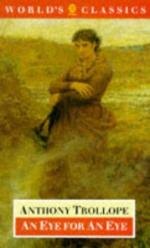The dowager sat alone all that morning thinking of the thing she had done. She did now believe that he was positively resolved not to marry Kate O’Hara, and she believed also that she herself had fixed him in that resolution. In doing so had she or had she not committed a deadly sin? She knew almost with accuracy what had occurred on the coast of Clare. A young girl, innocent herself up to that moment, had been enticed to her ruin by words of love which had been hallowed in her ears by vows of marriage. Those vows which had possessed so deadly an efficacy, were now to be simply broken! The cruelty to her would be damnable, devilish,—surely worthy of hell if any sin of man can be so called! And she, who could not divest herself of a certain pride taken in the austere morality of her own life, she who was now a widow anxious to devote her life solely to God, had persuaded the man to this sin, in order that her successor as Countess of Scroope might not be, in her opinion, unfitting for nobility! The young lord had promised her that he would be guilty of this sin, so damnable, so devilish, telling her as he did so, that as a consequence of his promise he must continue to live a life of wickedness! In the agony of her spirit she threw herself upon her knees and implored the Lord to pardon her and to guide her. But even while kneeling before the throne of heaven she could not drive the pride of birth out of her heart. That the young Earl might be saved from the damning sin and also from the polluting marriage;—that was the prayer she prayed.
CHAPTER VIII.
Loose about the world.
The Countess was seen no more on that day,—was no more seen at least by either of the two brothers. Miss Mellerby was with her now and again, but on each occasion only for a few minutes, and reported that Lady Scroope was ill and could not appear at dinner. She would, however, see her nephew before he started on the following morning.
Fred himself was much affected by the interview with his aunt. No doubt he had made a former promise to his uncle, similar to that which had now been exacted from him. No doubt he had himself resolved, after what he had thought to be mature consideration that he would not marry the girl, justifying to himself this decision by the deceit which he thought had been practised upon him in regard to Captain O’Hara. Nevertheless, he felt that by what had now occurred he was bound more strongly against the marriage than he had ever been bound before. His promise to his uncle might have been regarded as being obligatory only as long as his uncle lived. His own decision he would have been at liberty to change when he pleased to do so. But, though his aunt was almost nothing to him,—was not in very truth his aunt, but only the widow of his uncle, there had been a solemnity about the engagement as he had now made




